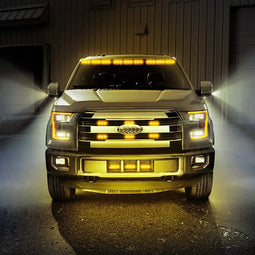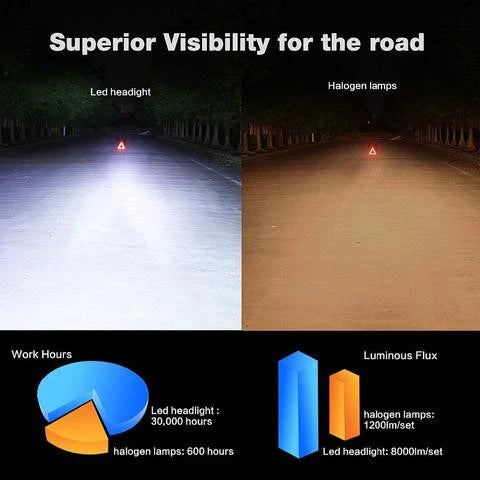LED vs Halogen Emergency Lights: The Ultimate Technology Showdown
The emergency lighting industry has undergone a revolutionary transformation over the past decade. While halogen emergency lights dominated the market for decades, LED emergency lighting technology has emerged as the clear winner for professional applications. This comprehensive comparison examines every aspect of both technologies to help fleet managers, emergency services, and commercial operators make informed decisions.
Why This Comparison Matters in 2025
Recent studies show that emergency services using LED light bars report 40% fewer equipment failures and 60% lower maintenance costs compared to halogen systems. With municipal budgets tightening and environmental regulations increasing, the choice between LED and halogen can impact your organization's bottom line for years to come.
Technical Performance Comparison: LED vs Halogen
Detailed Performance Metrics
| Performance Factor | LED Emergency Lights | Halogen Emergency Lights | Winner |
|---|---|---|---|
| Luminous Efficacy | 100-200 lumens per watt | 15-25 lumens per watt | LED |
| Lifespan | 50,000-100,000 hours | 1,000-2,000 hours | LED |
| Power Consumption | 3-50 watts typical | 35-100 watts typical | LED |
| Heat Generation | Minimal (80% light, 20% heat) | Significant (10% light, 90% heat) | LED |
| Cold Weather Performance | Excellent (-40°C to +85°C) | Poor (affected by extreme cold) | LED |
| Shock/Vibration Resistance | Excellent (solid-state) | Poor (fragile filament) | LED |
| Initial Cost | Higher ($200-2000) | Lower ($50-500) | Halogen |
| Flash Rate Precision | Perfect (electronic control) | Variable (mechanical/thermal) | LED |
Real-World Performance Analysis
LED Emergency Light Performance
- Instant On/Off: No warm-up time required
- Color Consistency: Maintains color temperature throughout life
- Multiple Patterns: Programmable flash sequences
- Weather Resistant: IP67+ ratings standard
Halogen Emergency Light Performance
- Warm-Up Time: Requires time to reach full brightness
- Color Degradation: Yellows over time
- Limited Patterns: Mechanical flash mechanisms
- Heat Issues: Generates significant heat
Total Cost of Ownership Analysis
5-Year Fleet Cost Comparison (10 Vehicle Fleet)
Cost Factor
LED System
Halogen System
| Initial Equipment Cost | $15,000 | $5,000 |
| Installation Cost | $2,000 | $2,000 |
| Annual Power Consumption | $480 | $1,920 |
| Replacement Bulbs/Components | $500 | $3,500 |
| Labor for Maintenance | $1,000 | $4,500 |
| 5-Year Total Cost | $21,900 | $29,200 |
| LED Savings | $7,300 (25% savings) | |
Application-Specific Recommendations
Law Enforcement Applications
Recommended: LED Technology
Police vehicles require reliable, high-intensity lighting for pursuit situations and traffic control. LED police light bars provide:
- Instant Activation: Critical for emergency response
- Multiple Flash Patterns: Different patterns for various situations
- Reliability: Won't fail during critical moments
- Dual Color Options: Red/blue combinations for maximum visibility
Fire & EMS Applications
Recommended: LED Technology
Fire and emergency medical services benefit significantly from LED lighting due to:
- Scene Lighting: High-intensity illumination without heat generation
- Extended Operations: Long-lasting performance during extended incidents
- Weather Resistance: Performs in all weather conditions
- Power Efficiency: Reduces load on vehicle electrical systems
Tow Truck & Recovery Operations
Recommended: LED Technology
Commercial towing operations require cost-effective, durable solutions. LED beacon lights offer:
- Amber Compliance: Meets DOT regulations for commercial vehicles
- Magnetic Mounting: Easy installation and removal
- Low Maintenance: Reduces operational downtime
- Cold Weather Performance: Essential for winter towing operations
Environmental and Regulatory Considerations
Environmental Impact Comparison
- Energy Consumption: LED lights use 70-85% less energy than halogen equivalents
- Carbon Footprint: Significantly reduced CO2 emissions over product lifetime
- Waste Reduction: Longer lifespan means fewer disposed units
- Heat Pollution: Minimal heat generation reduces vehicle cooling requirements
- Mercury-Free: LED lights contain no hazardous materials
Installation and Compatibility Considerations
Retrofitting Existing Systems
Most halogen emergency lighting systems can be upgraded to LED technology with minimal modifications:
LED Retrofit Considerations
- Voltage Compatibility: Most LED systems are 12V/24V compatible
- Mounting Systems: LED lights often fit existing mounting points
- Control Integration: LED control systems can interface with existing switches
- Flash Synchronization: LED systems can sync with existing emergency equipment
- Professional Installation: Recommended for optimal performance and warranty coverage
Common Myths and Misconceptions
Technology Future: What's Coming Next
Emerging LED Technologies
- Smart Integration: IoT-enabled lights with remote monitoring and control
- Adaptive Lighting: Automatic brightness adjustment based on ambient conditions
- Predictive Maintenance: AI-powered systems that predict component failure
- Enhanced Efficiency: Next-generation LEDs approaching 300 lumens per watt
- Autonomous Vehicle Integration: Machine-readable light patterns for self-driving vehicles
Making the Right Choice for Your Fleet
Decision Framework
Choose LED Emergency Lights If:
- You operate more than 3-5 emergency vehicles
- Maintenance costs are a significant concern
- Reliability is critical for your operations
- You want to reduce environmental impact
- Your vehicles operate in extreme weather conditions
- You need advanced features like programmable flash patterns
Consider Halogen Only If:
- Initial budget is extremely limited (though not recommended)
- You have existing halogen inventory to use up
- Your fleet is being retired within 1-2 years
Ready to Upgrade to LED Emergency Lighting?
Premium Services Technologies offers Canada's most comprehensive selection of professional LED emergency lighting solutions, backed by complete technical support and competitive fleet pricing.
Our Professional LED Emergency Lighting Range:
- Abrams Unity 55X Dual Color LED Light Bar - Professional grade, multi-pattern
- StarEye 7 Series LED Beacon - 36W high-intensity, SAE certified
- Surface Mount LED Strobes - Discrete installation, maximum visibility
- LED Control Systems - Advanced pattern control and synchronization
Fleet Consultation: sales@premium-services-technologies.com
Technical Support: Our certified technicians provide complete installation and maintenance support
Financing Available: Flexible payment options for fleet upgrades
Conclusion: The Clear Winner for Professional Applications
The comparison between LED and halogen emergency lights reveals a clear winner: LED technology offers superior performance, lower total cost of ownership, and better reliability for virtually all professional emergency lighting applications. While the initial investment is higher, the long-term benefits in reduced maintenance, improved reliability, and energy savings make LED the smart choice for modern emergency vehicle fleets.
Organizations that delay the transition to LED emergency lighting are missing opportunities for cost savings, improved safety, and operational efficiency. With technology improving rapidly and costs continuing to decrease, 2025 is the ideal time to upgrade your emergency lighting systems.
Transform your fleet's performance and reduce operational costs. Contact our LED emergency lighting experts at sales@premium-services-technologies.com or explore our complete professional lighting solutions at pstlight.com

![[AMBER] LED Rooftop 12](http://pstlight.com/cdn/shop/products/amber-led-rooftop-12-mini-emergency-strobe-lights-bar-332150.jpg?v=1709494678)
![[AMBER-WHITE] LED Rooftop 12](http://pstlight.com/cdn/shop/products/amber-white-led-rooftop-12-mini-emergency-strobe-light-bar-808762.jpg?v=1709494662)
![[GREEN] LED Rooftop 12](http://pstlight.com/cdn/shop/products/green-led-rooftop-12-mini-emergency-strobe-lights-bar-221471.jpg?v=1709494676)
![[AMBER] LED Rooftop 12](http://pstlight.com/cdn/shop/products/amber-led-rooftop-12-mini-emergency-strobe-lights-bar-332150_{width}x.jpg?v=1709494678)
![[AMBER-WHITE] LED Rooftop 12](http://pstlight.com/cdn/shop/products/amber-white-led-rooftop-12-mini-emergency-strobe-light-bar-808762_{width}x.jpg?v=1709494662)
![[GREEN] LED Rooftop 12](http://pstlight.com/cdn/shop/products/green-led-rooftop-12-mini-emergency-strobe-lights-bar-221471_{width}x.jpg?v=1709494676)

